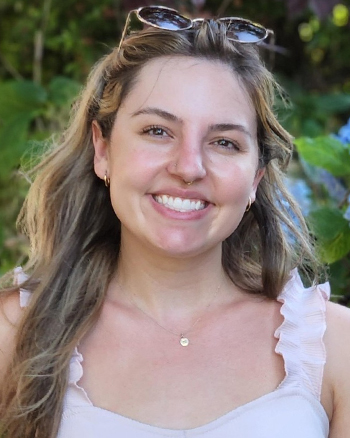
Hometown: Bellingham, Washington
Undergraduate: University of Washington – Seattle Campus
Can you tell me a little about yourself before coming to Drexel?
Before coming to Drexel, I worked as a technical manager at a start-up laboratory in Washington state. Specifically, I supported physician offices around the country in setting up in-house testing for urinary tract infections and antibiotic resistance PCR assays. My responsibility included training technicians, planning and writing validations, assisting with CLIA certification, and assay troubleshooting.
Why did you decide to apply to Drexel’s PathA program?
My undergraduate education and work experience were focused on veterinary medicine and my initial plan was to apply to veterinary school after graduation. However, the COVID-19 pandemic interrupted my senior year, and I had to move home. While completing my degree remotely, I began working as an accessioner in a COVID testing lab, where I met a pathologists’ assistant who is still my mentor today. She introduced me to pathology and recommended Drexel’s program, as she was an alum herself. I knew that I wanted to obtain a master’s degree and realized that I preferred the indirect patient care provided in the laboratory setting. I also valued the work-life balance and lifelong learning that a career as a pathologists’ assistant offered. After completing my projects as a technical manager, I decided to apply and was offered attendance at Drexel’s program!
What was your experience in the program like?
The first year of the program is very challenging as there is so much to learn in such a short amount of time. However, I think that the professors, especially those for medical pathology and applied anatomic pathology, did an excellent job in focusing on high-yield concepts and ensuring that we were exposed to a wide range of material. I felt prepared to gross specimens at the beginning of my clinical rotations and was surprised by how many conditions and diseases I recognized.
What did you like most about the program?
My favorite part of the program has been clinical rotations. I am a hands-on learner and I learn best by being able to see and feel specimens. The variety of clinical experiences Drexel offers has helped me to identify the types of labs that might be the best fit for me after graduation.
What was your relationship like with the PathA faculty?
The PathA faculty was very supportive to all of us as students, and they really want to see all of us succeed in the program. As many of the professors have careers outside of being a professor, they were all very understanding of our busy lives as students and were willing to be flexible with scheduling when needed. Additionally,
the small class sizes made the learning environment feel very personal and comfortable, which I greatly appreciated.
How was your relationship with your classmates?
With only 12 students in the program, we all became very close. It was nice being able to study together and share the challenges of the program. Although some of the weeks were very difficult, it was never lonely!
The PathA program offers a year of practical work in the field. Where have you worked during that time, and what was the experience like?
My clinical rotations have included the Hospital of the University of Pennsylvania, Memorial Sloan Kettering in New York City, Paoli Hospital, the Philadelphia Medical Examiner’s Office, the Children’s Hospital of Philadelphia and Jefferson Einstein Hospital. I am currently on my second rotation at MSK, and my experience so far has been very positive. I feel that the applied anatomic pathology course that we take in spring quarter prepared me well for my rotations, and I feel more confident with each passing day.
Would you recommend the PathA program to others who are interested in this field?
Yes, I would recommend the Drexel PathA program to others. Philadelphia is an amazing location and close to many major cities. Although I moved across the country to attend Drexel, I would absolutely recommend it to others as I have learned a lot outside of the classroom as well. I have had exposure to other areas where I may want to live in the future and have been able to make so many meaningful professional connections with other people in the field.
Do you have any advice for future PathA students?
Study hard and face challenges day by day. It is a lot of material and more than you can learn in a year, but the education and hands-on experience will eventually come together in the end. You will not know all that you need to know by the end of the year, but that is one of the most exciting things about this field: We have the rest of our professional careers to learn and develop our expertise.